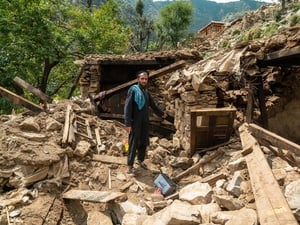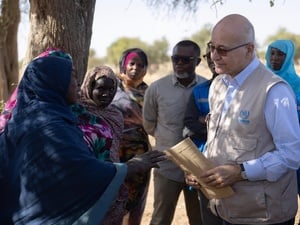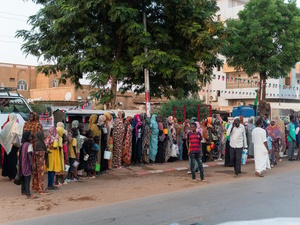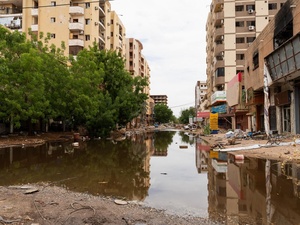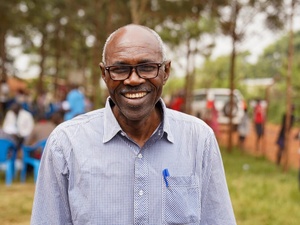Transfer of Sudanese between Ugandan camps now proceeding calmly
Transfer of Sudanese between Ugandan camps now proceeding calmly
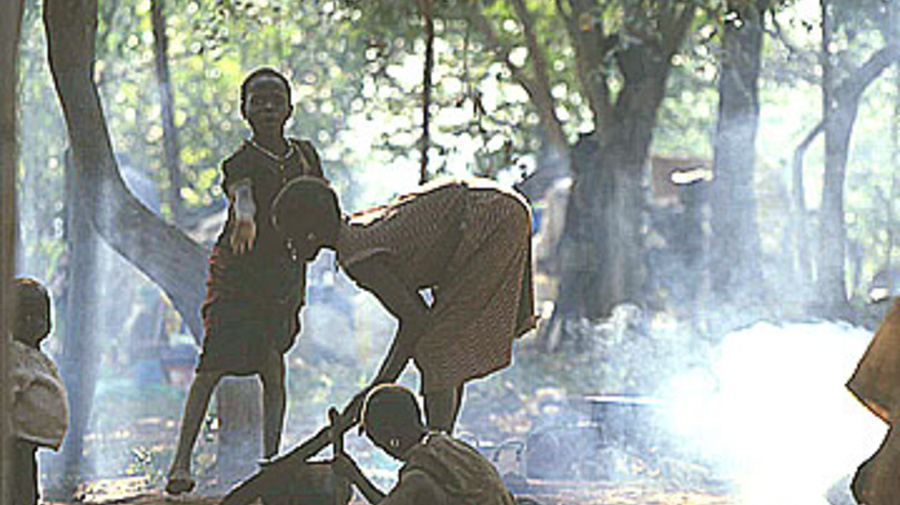
Sudanese refugees crowded into Kiryandongo after fleeing last year's rebel attacks in Achol-Pii camp.
KAMPALA, Uganda, Sept 8 (UNHCR) - More than half the 16,000 Sudanese refugees scheduled to be relocated from the overcrowded Kiryandongo camp in western Uganda have now been successfully transported to new camps in the north of the country, after violent scenes marred the start of the government-run operation on September 1.
The refugees are being transferred to two new sites in Uganda's West Nile region - Madi Okollo, a former refugee camp that has been recently rehabilitated, and Ikafe.
Those affected by the relocation from Kiryandongo camp are the remaining 16,000 refugees out of a group of more than 24,000 who were displaced from Achol-Pii refugee settlement (Kitgum District) in August 2002 following a series of vicious attacks by the rebel Lord's Resistance Army (LRA). The repeated attacks on Achol-Pii left dozens of refugees dead and large numbers injured.
When the displaced refugees arrived in Kiryandongo - already home to another 13,000 Sudanese refugees - in August 2002, they placed enormous pressure on the camp's limited resources. Firewood, water, health and educational facilities were insufficient for a camp population that had nearly tripled in size.
Since there was little room for expansion in Kiryandongo, the transfer of the refugees to other locations was unavoidable. An initial 8,000 of the Achol-Pii group were moved out of Kiryandongo to another site soon after their arrival, without incident.
However, the start of the current transfer was blighted by violent clashes between Ugandan security personnel and stone-throwing refugee youths who were objecting to the location of their proposed new home.
On September 4, after the tense situation in Kiryandongo had calmed down, UNHCR officials received government authorization to enter the camp for the first time since the operation began.
During their visit, they found thousands of refugees living under makeshift shelters as they awaited their turn on the daily relocation convoys taking them up north - a 30-hour drive by truck. Many refugee families were sheltering under plastic sheeting and other rudimentary structures in conditions that had been made more difficult by the onset of the short rainy season. In addition, the section of the camp hosting the waiting refugees was extremely congested, the UNHCR officials said.
Elsewhere in the camp, huts vacated by refugees who had already been transferred to the new camps had all been burnt down.
The UNHCR team also visited the health centre in the camp where they saw four refugees who were injured by rubber bullets during the fracas which marked the start of the relocation operation last Monday. A 50-year-old woman, who was also wounded during the clashes, was recuperating after surgery at the Kiryandongo Hospital.
UNHCR staff also visited the prison at Kiryandongo where 25 refugees are being held on charges including disobedience of lawful order, causing malicious damage to property and carrying arms in public. Twenty-one refugees have already appeared before the local magistrate. Among the detained refugees were three minors who have since been released into the care of their relatives. It is expected that the charges against them will be dropped. UNHCR is looking into possibilities of providing legal counsel for those refugees facing trial.
At the new sites in Madi Okollo and Ikafe, in north-western Uganda, UNHCR staff continued with the registration and settlement of the refugees arriving daily from Kiryandongo. Additional staff have been deployed from other UNHCR offices in Uganda to support activities at both sites.
The relocation exercise is expected to be completed within the next few days.





